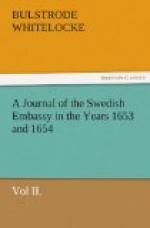After their discourse, Whitelocke presented Piementelle his medal in gold very like him, and it was received by Piementelle with much affection. Then Piementelle entreated Whitelocke to give him a passport for his servant, who had the charge of conducting his baggage by sea to Dunkirk, that he might freely pass the men-of-war of England; the which was willingly done by Whitelocke, under his hand and seal.[86]
April 5, 1654.
[SN: Conference with the Chancellor.]
In the morning Whitelocke went to the Chancellor’s lodging, and found his son Grave Eric with him. The Chancellor made a long apology to excuse the delay of the treaty, and said:—
Chancellor. My indisposition of health hath chiefly occasioned the delay, yet was I so solicitous of your business, that I entreated the Queen to appoint some other person in my stead, who might confer with your Excellence; and her Majesty was pleased to appoint my son for that service.
Whitelocke. I was very sorry for your Excellence’s want of health, both in regard of my affection to your person, and in respect of the protraction of my business; yet I was glad that your son, my Lord Eric, was appointed to confer with me, and had rather have the transaction of my business by yourself or some of your family than by any other. I am now come to you to confer upon those articles which yesterday I received from you.
Then Whitelocke gave the Chancellor a paper of his animadversions upon his articles. The debate began upon the ninth article; and as to the sale of goods taken from enemies and prohibiting the buying of arms, the Chancellor said this would abolish their trade, and would be of no advantage to England, because those arms, and equally as good, might be had from other places; and if the English did light upon them, they would have the benefit by it. Whitelocke said it would be a great inconvenience to furnish the enemies of either nation with arms which could not be had elsewhere than in England or Sweden, and that this clause would put a bridle in the mouths of the enemies of either nation. The Chancellor and his son replied that arms might be had in the province of Liege,[88] and in many other places in Germany; that Sweden scarce afforded any other commodities but arms, or such things as were serviceable for war; and that the Queen would by no means be induced to that clause as Whitelocke would have it.
Then they debated upon the eleventh article, the issue whereof was for Whitelocke to consent to a special designation of prohibited goods. Whitelocke desired that the catalogue and designation of them might be referred to his return into England, and he would agree that within two months after that there should be a specification of prohibited goods in the name of the Protector.
The Chancellor urged that the specification might be now agreed upon, and produced a paper specifying them, which they alleged was delivered by the Council in England unto Bonnele. Whitelocke said he did not remember the same, and that he was ignorant what goods were prohibited by the Dutch placard, which was fit to be known before any specification made by him.




